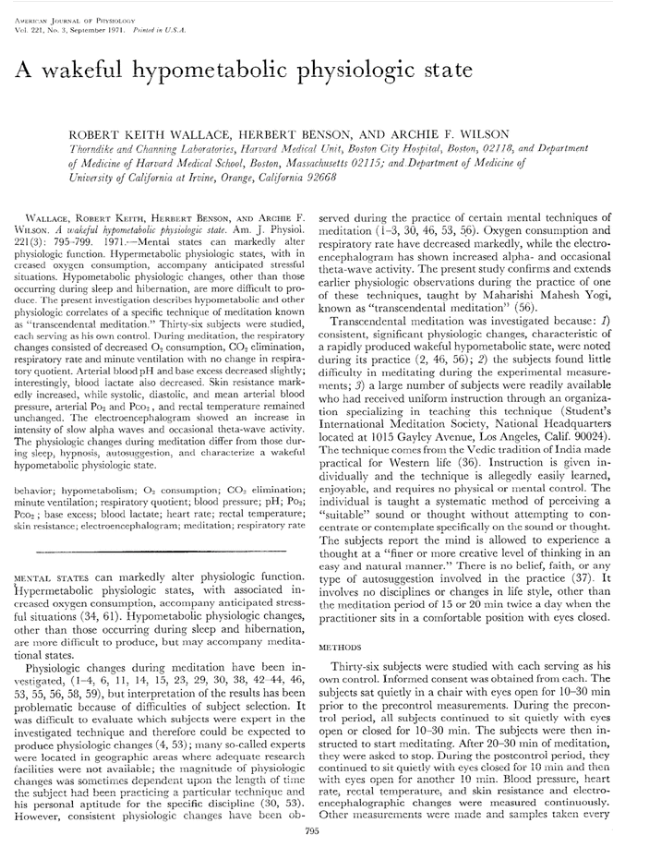Mental states can markedly alter physiologic function. Hypermetabolic physiologic states, with an increased oxygen consumption, accompany anticipated stressful situations. Hypometabolic physiologic changes, other than those occurring during sleep and hibernation, are more difficult to produce. The present investigation describes hypometabolic and other physiologic correlates of a specific technique of meditation know as “transcendental meditation”. Thirty-six subjects were studied, each serving as his own control. During meditation, the respiratory changes consisted of decreased O2 consumption, CO2 elimination, respiratory rate and minute ventilation with no change in respiratory quotient. Arterial blood pH and base excess decreased slightly; interestingly, blood lactate also decreased. Skin resistance markedly increased, while systolic, diastolic, and mean arterial blood pressure, arterial PO2 and PCO2, and rectal temperature remained unchanged. The electroencephalogram showed an increase in intensity of slow alpha waves and occasional theta-wave activity. The physiologic changes during meditation differ from those during sleep, hypnosis, autosuggestion, and characterize a wakeful hypometabolic physiologic state.
A wakeful hypometabolic physiologic state
Publication
American Journal of Physiology
Vol 221, No. 3
Abstract
Web and Email Links
Related Listings
Journal
Biofeedback and Self-regulation
The purpose of this study was to assess the central nervous system effects of the relaxation response (RR) in novice subjects using a controlled, within- subjects design and topographic EEG mapping as the dependent measure. Twenty subjects listened to a RR and control audiotape presented in a counterbalanced order while EEG was recorded from 14 scalp locations. The RR condition produced greater (p < .0164) reductions in frontal EEG beta activity relative to the control condition. N […]
Journal
Journal of Human Stress / Behavioral Medicine
A previous investigation has demonstrated that the practice of a meditational technique elicits a wakeful, hypometabolic state. Measurement of O2 consumption and CO2 elimination was made by sampling techniques; mean values of these parameters were calculated from 6–10 minute samples. The present study extends this investigation, using a recently developed method of continuous measurement of O2 consumption and CO2 elimination. Continuous measurement of these parameters permitted the de […]
Journal
Nature
Since meditative practices are associated with changes that are consistent with decreased activity of the sympathetic nervous system, it is conceivable that measurable body temperature changes accompany advanced meditative states. With the help of H.H. the Dalai Lama, we have investigated such a possibility on three practitioners of the advanced Tibetan Buddhist meditational practice known as g Tum-mo (heat) yoga living in Upper Dharamsala, India. We report here that in a study perfor […]

